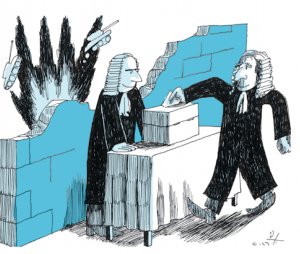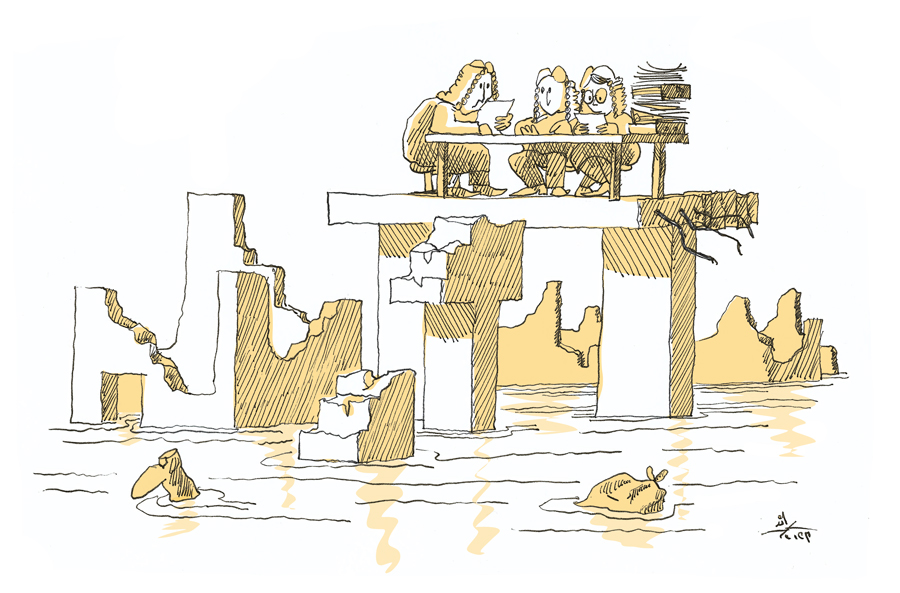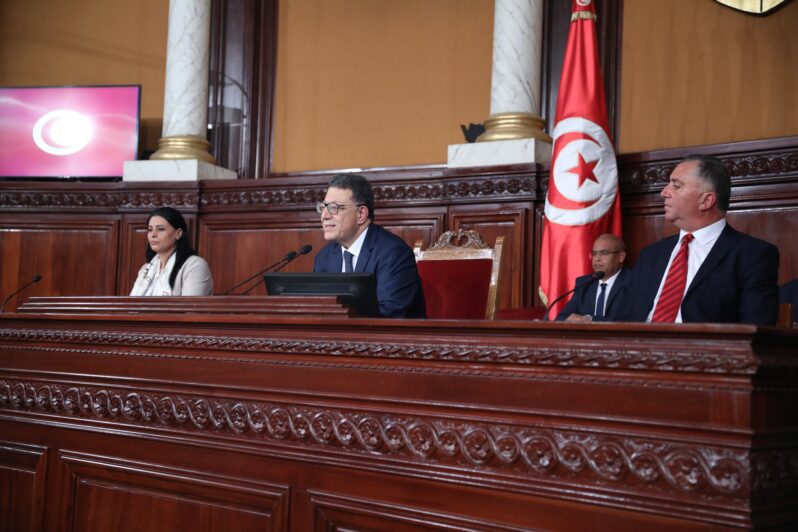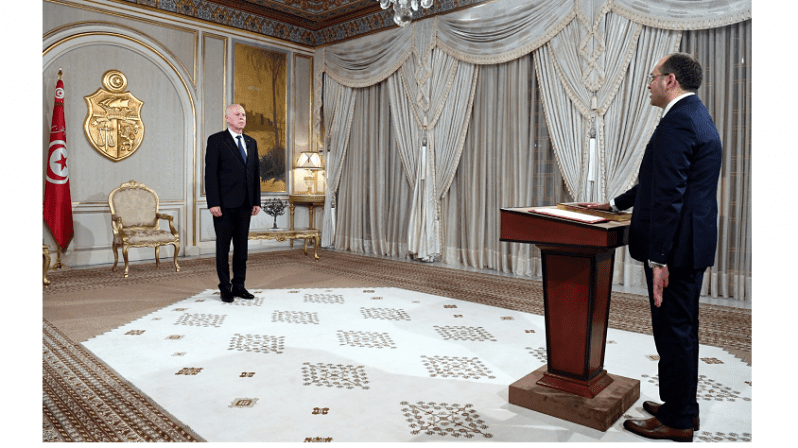The Supreme Judicial Council in Libya Carry Commendable Elections

Since Libya's independence in 1951, the judicial system thereof did not witness any election of the members of the Supreme Judicial Council (SJC). The only way to be a member of the SJC was through appointment or what jurisprudence calls accrual membership, which is by virtue of judicial position.[1] This system was modified under Law No.14 for the year 2013 on amending the justice system law. The modified law provides for elections as a mechanism for admission to the SJC.[2] The same law authorized the SJC to take the suitable mechanism to conduct the electoral process. As soon as the law was passed, the first council was elected for three years and continued its mandate until May 2016. In preparation for the election of new members, the SJC formed supervisory committees and issued election regulating decisions. The SJC successfully managed to conduct the elections in phases in the period of April to May 2016, despite poor overall conditions in Libya.
Objective and Procedural Assessment
The judiciary was overall affected by the situation of instability and lawlessness plaguing the country, which resulted in an attack on some judicial institutions and the assassination of judges. This led to the closure of some courts and public prosecutions, which affected the work of the judiciary.[3] Against the backdrop of these events and their consequences, some members of the judiciary objected to conducting the elections in this critical and inappropriate timing.
Cyberspace, especially social media, was a vast space to express objection and criticism over the elections. There were several views: Some considered that the experience [elections] itself is not worth repeating due to the failure of the formerly elected SJC in conducting judicial work in a good manner.[4] Others gave a more detailed criticism, blaming the regulatory law for eliminating judges of the courts of first instance, prosecutors and other members of judicial bodies of the same level[5], thus, violating the principles of equality, diversity and representation.[6] What is even more strange is that the law did not only prohibit them from running as candidates, but also from voting [in these elections], in a distasteful consecration of the phenomenon of hierarchy.[7]
Such a defect in the law shows the importance of not overlooking the participatory approach in the passing of laws. The bill was introduced unilaterally by the SJC which consists of only two chancellors. It was not presented to the judges, prosecutors, and other members of the judicial bodies for discussion and expression of their opinions; therefore, the bill did not reflect different and various views.[8]
Perhaps the legislator’s authorization to the SJC to take on the task of organizing and supervising the elections and determining the mechanism for this task raises questions about the guarantees of the electoral process itself, and the impartiality of the supervisory body. If a member of the SJC may wish to run again, how could there be integrity if that member is both a supervisor and a participant in the elections at the same time? The issue even goes far beyond that, as the SJC not only organizes the election but supervises it under authorization by the legislature; this gives its decisions over the electoral process a legislative nature and immunizes it against the monitoring of the judiciary, except in terms of constitutionality.
Criticism by some judicial bodies included the electoral procedures adopted by the SJC, such as that the elections were not conducted on the same day and timing, or that the body supervising the elections is subordinate and numerous. Some have demanded that the Higher Electoral Commission supervise the elections as it is considered an impartial, independent, and competent body.[9]
It should be noted that the bulk of this criticism is of a technical and professional nature, expressed by judges and members of the judicial bodies themselves. The public opinion or the media had no interest in, or follow-up on the issue. Eventually, all of the criticism did not impede the progress of the electoral process; rather, it represented a good critical vision that aimed to assess the flawed electoral law and its regulatory and administrative procedures.
The General Atmosphere of the Elections
There is no doubt that what is more important than the judicial conditions in which the elections were conducted and the technical evaluation is the overall situation of the country which is going through tough political conditions. Such conditions have resulted in an intense political dispute linked to numerous armed conflicts leading to a state of instability with potential disastrous consequences. Among the most prominent aspects of this crisis is the split of the legislative authority into East and West and the duplication that followed in the two governments and sovereign institutions, such as the Central Bank of Libya, the Audit Bureau, and the administrative monitoring apparatus.[10] Even the political agreement which was concluded between the parties of the conflict failed to alleviate the political crisis.[11] There were disagreements over the application of the terms of the agreement itself. Moreover, the government of reconciliation emanating from that agreement was not even adopted.
As a result of this suffocating political crisis, the SJC entered a real challenge and began to pave the way for conducting the elections by announcing the formation of committees to oversee the various courts and judicial bodies, and opening candidacy lists for those wishing to run for the elections. The SJC announced the final lists and set the election date for each appeal court and judicial body separately, including the newly-established Gharyan and al-Bayda Appeal courts.
Positive Messages
Despite all the criticism against the regulatory law and the administrative procedures of the electoral process, the success and completion of these elections have sent several important positive messages, namely:
No political interference by any party to exploit this electoral process in its favor. Perhaps this was the case because parties were already preoccupied with their political and military conflicts. This reflected positively on the elections which were fair, without incident, and free from the distractions of politics.[12]
The most prominent positive message was the strong participation of women judges which was present in almost all bodies. The nomination lists included many women candidates running for membership of the SJC. In some appeals courts and other judicial bodies, the percentage of women in nomination lists reached 50%. For example, in the cases administration category, there were four female candidates out of eight. In the attorney general category, five women from a total of nine candidates were on the nomination list. It did not stop at only participation in the nominations, but went beyond that when one of the female candidates (Chancellor Widad al-Hamali running for Benghazi Appeals Court) won the membership. Al-Hamali made history as the first woman judge elected to the SJC. Her election came as a strong response to the calling of some to eliminate women from judicial posts. Objectors even submitted challenges seeking to deem women’s assumption of judicial positions as unconstitutional.[13]
This victory is of significance [in several respects]; most prominently that competence is what counts in judicial performance and positions, and that women judges enjoy the confidence of their colleagues. Moreover, this result reflects a state of public satisfaction with women’s role as judges, as well as their efficiency and good performance which contribute to the strengthening of this role and their status.[14]
The most influential message the elections have conveyed to everyone is unity among the judiciary, and their cohesion and steadfastness in spite of the overall political division which affected the legislative and executive authorities, and most of the state’s sovereign institutions. This message can be a safety valve for the unity of Libya.[15] Evidence of this unity and solidarity lies in the judicial bodies’ response to the electoral process and their commitment to the decisions of the SJC, despite their presence in cities and regions under the control of different governments and authorities. In addition, the elections witnessed a reasonable turnout by members of the judiciary and was carried out in a normal atmosphere.[16] An elected Supreme Judicial Council resulted from this; a council that represents a mosaic of the country, with members from various cities representing all kinds of courts.
For example, the elections included the nine appeals courts in addition to the judiciary’s branches spread in several cities and regions throughout the geographical area of Tripoli, Misrata, Zawiya, al-Khams, Gharyan in the west, Benghazi and Jebel Akhdar and al-Bayda in the east, and Sabha in the south.[17]
Conclusion
The will of judges and members of the judiciary, including the SJC, had a direct and crucial impact on the success of these elections despite [several] reservations and observations. The common will of members of the judiciary, their national spirit and keenness on the continuation and sustainability of the judicial pillar, distancing it from political pressure, have made them overcome all the shortcomings of the electoral process and contribute to its execution and success. This positive engagement with the elections is driven by the strong commitment of members of the judicial bodies to keep the judiciary united, as they are well aware that such unity will reflect positively on the country, and will ward off the danger of division that has been plaguing the state every now and then.
This article is an edited translation from Arabic.
__________
[1] See: “Judicial Developments in 2012”, published on The Legal Agenda, March 2012.
[2] The head of the SJC is not elected, but appointed by virtue of his position as head of the Supreme Court.
[3] “Judicial Developments 2013-2014”, The Legal Agenda, June 2015.
[4] Opinions collected from interviews with members of judicial bodies.
[5] The Libyan Judges Organization demanded representation of judges of first instance courts and submitted its observations to the legislative authority.
[6] Mr. Mohamed Hammouda, member of the General Management of the Law, interposition at the Judiciary Reform Conference in Tunisia, May 23-27, 2016.
[7] See: “Exclusion of Young Judges from the Supreme Judicial Council; For How Long?” The Legal Agenda – Tunisia, Issue No. 0.
[8] “Law Making After Gaddafi”, a Study by the Center on Law and Society at the University of Benghazi and the University of Leiden.
[9] Interview with Mr. Ali Bouras, President of the General Prosecutor's, May 27, 2016.
[10] The House of Representatives in Tobruk and the National General Conference in Tripoli since August 2014.
[11] The political agreement signed in Skhirat town in Morocco under the auspices of the United Nations, between political parties such as the General National Congress and the House of Representatives.
[12] Opinions collected from interviews with members of judicial bodies.
[13] Constitutional Challenge No. 10/60 in 2012, and Constitutional Challenge No. 14/60 in 2013.
[14] See: Judge Khaled Abdul-Karim al-Sharif’s article on the Facebook page of the Libyan Judges Organization, April 14, 2016.
[15] Opinions collected from interviews with members of the judicial bodies.
[16] The website of the Ministry of Justice.
[17] Libya consisted of three regions: Tripoli and its capital Tripoli in the west and Cyrenaica and its capital Benghazi in the east and Fezzan and its capital of Sabha in the south.



